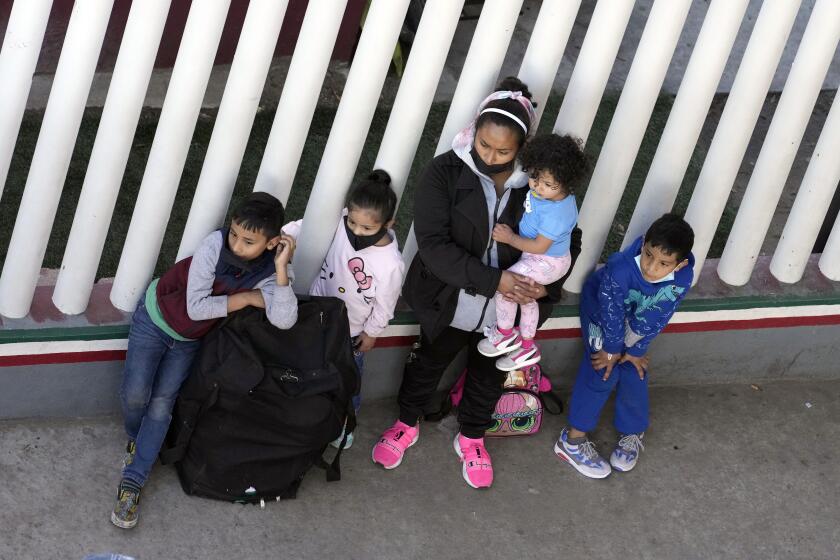U.S. authorizes sending 1,500 troops to southern border before Title 42 ends
- Share via
Biden to send 1,500 active-duty troops to U.S.-Mexico border as Title 42 order expires. About 2,500 National Guard members are already there.
- Share via
WASHINGTON — The Biden administration plans to send 1,500 active-duty soldiers to the U.S.-Mexico border for 90 days, federal officials have announced.
The move Monday comes ahead of the anticipated increase in the number of migrants at the border as of May 11, when Title 42, a pandemic-related immigration policy, expires. U.S. Homeland Security officials said service members would not perform law enforcement functions or interact with migrants in custody. Troops will begin to arrive as soon as May 10.
About 2,500 members of the National Guard are already stationed at the nine sectors of the southwest border, doing support work for U.S. Customs and Border Protection, one official said. The additional troops will bring the total to 4,000 military personnel.
U.S. officials said the 1,500 Army and Marine Corps troops, requested by the Homeland Security Department, will fill critical “capability gaps,” such as watching for crossings, monitoring camera feeds, data entry and warehouse support.
Military “personnel have been supporting [Customs and Border Protection] at the border for almost two decades now, so this is a common practice,” White House Press Secretary Karine Jean-Pierre told reporters on Tuesday.
“This would not be necessary if Congress would act,” she added.
Title 42 orders are set to end May 11. Implemented amid the COVID-19 pandemic, the policy prevents migrants from requesting asylum, allowing border agents to swiftly turn many of them back to Mexico.
When Title 42 orders lift, immigration agents will return to processing people under Title 8. Deportations under Title 8 carry stiffer consequences.
The Homeland Security Department said in a statement that the request for more troops is due to an anticipated increase in arrivals of migrants seeking to enter the U.S. Support from the troops will free up Homeland Security personnel to fulfill their own law enforcement duties, officials said.
The Defense Department has supported Homeland Security on the border every year since 2006, Brig. Gen. Pat Ryder said at a news conference Monday. He said Pentagon officials were evaluating whether they could replace the active-duty forces with others, such as reserve troops and contracted support, before the 90 days is up.
In 2018, then-President Trump sent 5,800 active-duty troops to the southern border amid the arrival of a caravan of thousands of migrants from Central America, which he characterized as an “invasion.” Initially the troops laid razor wire and conducted other tasks, but later the White House expanded their authority, allowing them to use force and provide crowd control to protect border agents.
Advocates for immigrants decried Monday’s decision as an unnecessary tool from Trump’s playbook.
Jonathan Blazer, director of border strategies for the American Civil Liberties Union, said in a statement that the move amounted to “political optics.”
“People who have been forced to flee their homes and embark on arduous, dangerous journeys for the chance to seek legal protection in the U.S. should be met with compassion — not military troops,” he said. “President Biden has had years to prepare for the long-overdue end to Title 42.”
Ryder, the Pentagon spokesman, sidestepped a question about political implications, saying: “Clearly, [Homeland Security] felt that there was a need for the Department of Defense to assist so that they can continue to do their important work.”
Biden also signed an executive order Thursday “to order the Ready Reserve of the Armed Forces to active duty to address international drug trafficking.” The executive order pre-authorized the Department of Defense to fulfill the request for troops by DHS. The order builds on one from December 2021, which declared an emergency to address the national security threats of narcotics trafficking.
Times staff writer Courtney Subramanian and San Diego Union-Tribune staff writer Kate Morrissey contributed to this report.
More to Read
Get the L.A. Times Politics newsletter
Deeply reported insights into legislation, politics and policy from Sacramento, Washington and beyond. In your inbox twice per week.
You may occasionally receive promotional content from the Los Angeles Times.













